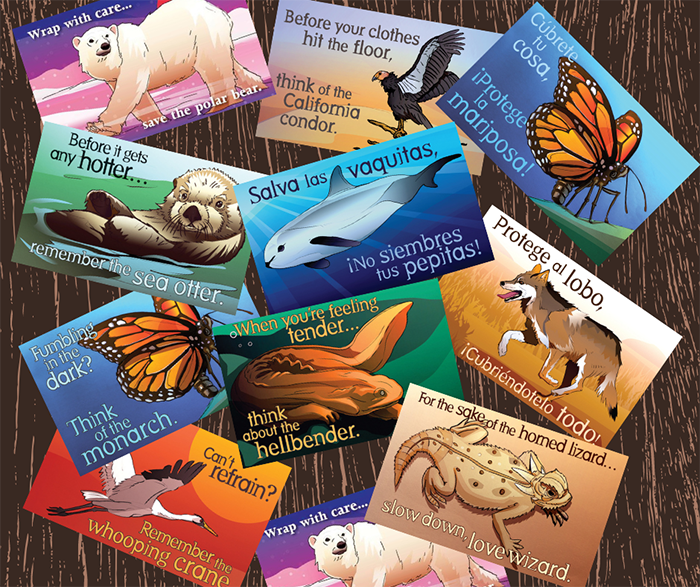#MoveTheDate
If every other family had one less child and parenthood was postponed by two years, by 2050 we would move Overshoot Day 49 days.*
*NOTE: If we continued as now, we would be at 9.7 billion. This is the UN medium variant estimate. If each mother or father had on average 1.8 children (= 0.9 children per person), compared to 2.3 currently, and parenthood was delayed by 2 years, we’d be at 7.7 billion in 2050. Assuming humanity’s Ecological Footprint per capita stays at 2020 levels (2.47 gha per person), the difference in 2050 would be 49 days.
What is the solution?
Endangered Species Condoms offer a fun, unique way to break through the population conversation taboo and get people talking about the link between human population growth and the wildlife extinction crisis.
This solution improves our resource security in the population category.
How does it #MoveTheDate?
1 million condoms have been given away since the project started 12 years ago. Their distribution has helped educate people across the country about how endangered species — from Ozark hellbenders to monarch butterflies — are affected by our rapidly growing numbers.
How is it scalable?
The Endangered Species Condoms project has distributed condoms across the United States through a volunteer network. Volunteers may sign up to receive Endangered Species Condoms to give out in their community.
What is the solution?
Endangered Species Condoms offer a fun, unique way to break through the population conversation taboo and get people talking about the link between human population growth and the wildlife extinction crisis.
This solution improves our resource security in the population category.
How does it #MoveTheDate?
1 million condoms have been given away since the project started 12 years ago. Their distribution has helped educate people across the country about how endangered species — from Ozark hellbenders to monarch butterflies — are affected by our rapidly growing numbers.
How is it scalable?
The Endangered Species Condoms project has distributed condoms across the United States through a volunteer network. Volunteers may sign up to receive Endangered Species Condoms to give out in their community.

The rapid growth of our human population is pushing other species off the planet in what most scientists are calling the sixth mass extinction crisis. Yet this population explosion is too often ignored by the public, the media and even the environmental movement, while it continues to drive all the major environmental problems that plague our planet — including climate change, habitat loss, ocean acidification and resource depletion.
That’s why the Center for Biological Diversity launched the Endangered Species Condoms project in 2009, and since then has distributed hundreds of thousands of free condoms across the United States. Wrapped in colorful, wildlife-themed packages (with artwork by Shawn DiCriscio), Endangered Species Condoms offer a fun, unique way to get people talking about the link between human population growth and the species extinction crisis.
The beautifully designed packages, with their rhyming slogans, are distributed by a network of population volunteers around the country. The condoms are handed out at concerts, bars, universities, spiritual group meetings, farmers’ markets and other many other types of local events. Each package contains — along with two condoms — original artwork and information on the species featured; facts about unsustainable human population growth and its link to the extinction crisis; and solutions to the population problem, including universal access to contraception and reproductive healthcare and education and empowerment for women and girls.
There’s no benefit in waiting!
Acting now puts you at a strategic advantage in a world increasingly defined by ecological overshoot. Countless solutions exist that #MoveTheDate. They’re creative, economically viable, and ready to deploy at scale. With them, we can make ourselves more resilient and #MoveTheDate of Earth Overshoot Day. If we move the date 6 days each year, humanity can be out of overshoot before 2050.

